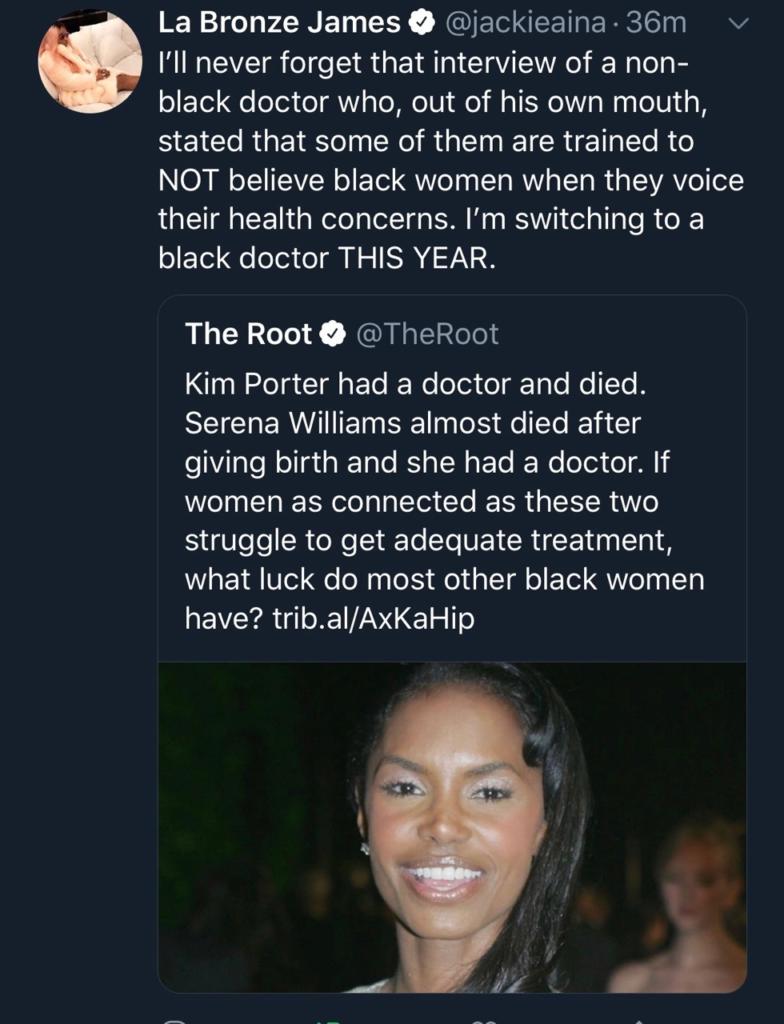
The passing of model, actress, and mother Kim Porter, hit the world hard. She was a beautiful Black woman who seemed healthy, had no previous signs of health issues, but then passed away at the young age of 47.
Porter died on November 15, 2018, in Toluca Lake, California after several days of “flu-like symptoms”. Her cause of death was listed as “deferred” on her death certificate, and after an autopsy was completed on November 16, 2018, the Los Angeles County Coroner’s Office confirmed on January 25, 2019 that her official cause of death was a result of lobar pneumonia.
As the ex of media mogul Sean “Diddy” Combs, Combs remembers the last conversation the two of them had.
“She had the flu, and she sent the kids over to my house so they wouldn’t get sick,” he said. “One night I was checking on her, and she was like, ‘Puffy, take care of my babies.’ ” She actually said that to me before she died.”
He said he “jumped into mommy mode” to make sure their children didn’t learn of her death from social media – right down to having their son’s phone disconnected as he was on a plane so he couldn’t read about it while he was traveling.
“Every time Kim and I talked, it was about the kids,” Combs said. “It was what she cared about the most. We’d check in as friends, of course, but we never had a conversation that didn’t include the kids.”
Now, there are stories going around that say she had issues, had a doctor, but the doctor did not listen to her. This is eerily familiar to the true story of Serena Williams during labor. Serena had to literally ‘save her own life’ because her doctor didn’t believe the level or seriousness of pain she was going through.
Given this environment where the person who is supposed to help you–your doctor–is not listening to you, many black women have found their own ways to advocate for their health. From making a full-on production about their pain to asking a thousand questions a thousand different ways, something has to be done.

Black women’s bodies have been abused by the medical profession for hundreds of years. J. Marion Sims is considered the “father of modern gynecology.” Sims was a surgeon from Alabama who performed a series of experimental procedures on enslaved Black women in the mid-1800s. None of these women were consenting to these procedures and were often operated on without the use of anesthesia, or numbing agents.
The inhuman treatment of these women perpetuated the belief that because of the color of our skin, Black women and Black people are biologically more adverse to pain than white people. This myth has stuck with us for generations.
Doctors Caught Not Believing Black Women
Fast forward to the 20th century, African Americans are now routinely under-treated for their pain compared with whites, according to research. A study released in 2016 shed some disturbing light on why that might be the case.
Researchers at the University of Virginia quizzed white medical students and residents to see how many believed inaccurate and at times “fantastical” differences about the two races — for example, that blacks have less sensitive nerve endings than whites or that black people’s blood coagulates more quickly.
They found that fully half thought at least one of the false statements presented was possibly, probably or definitely true.
Moreover, those who held false beliefs often rated black patients’ pain as lower than that of white patients and made less appropriate recommendations about how they should be treated.
The study, published in the Proceedings of the National Academy of Sciences, shows one of the most frustrating problems in pain treatment today: That whites are more likely than blacks to be prescribed strong pain medications for equivalent ailments.
The study concluded that, “A substantial number of white laypeople and medical students and residents hold false beliefs about biological differences between blacks and whites, and demonstrates that these beliefs predict racial bias in pain perception and treatment recommendation accuracy.”
Black women’s pain is real and the medical system is broken. Misogynoir is more pervasive than what is generally perceived, and Black women deserve to been seen. Many Black women spend more time trying to convince their doctors the need to provide the care they need than actually receiving it. The time is now to stop that.
How We Can Use Kim’s Example to Fight for Our Lives
Here are a few tips on how to talk to your doctor to be sure that he/she truly understands your situation:
I. Get Descriptive: Use Metaphors and Memories
You can help doctors understand just how debilitating your pain is by being more descriptive.
It’s perfectly OK to be a little more flowery in the description of pain, such as “My pain is aching, burning.” In your description, answer the questions, “What does it feel like to you? Where is it? Does it move?”
Also, compare your current pain to the worst pain they ever had, such as childbirth or kidney stones. This helps put your pain in context and may help the doctor pinpoint the cause of your pain more effectively.
II. Don’t Be Afraid to Disagree
If your doctor seems to be shrugging off your symptoms as “all in your head” or suggesting what seems to be an unreasonable course of action, make sure you fully explain why you disagree. Perhaps this pain feels different or lasts longer than the usual aches, or perhaps you can’t comprehend how your doctor reached a particular diagnosis based on your medical history. Sometimes challenging your doctor can reveal mistakes. And doctors, like everyone else, make them from time to time.
III. Write Out Your Questions in Advance
It’s common to forget what you wanted to discuss while you’re undergoing a quick exam. If possible, try to write out some questions before your appointment concerning your preferences for follow-up and treatment. If you don’t know what kinds of questions to ask or how to ask them, check out the Agency for Healthcare Research and Quality’s website.









